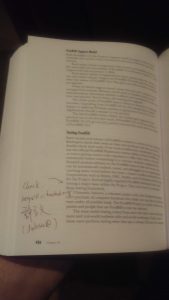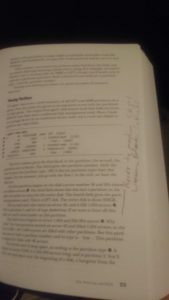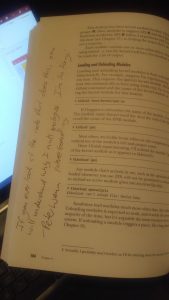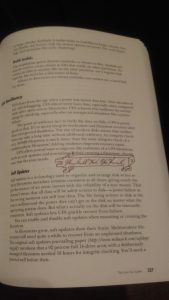TLDR: FreeBSD auction here, OpenBSD auction here. Bids on this page will be ignored.
 The brand-new third edition of Absolute FreeBSD is in one of my greasy mitts right now. As is customary, I’m using this to persuade other people to give money to the FreeBSD Foundation.
The brand-new third edition of Absolute FreeBSD is in one of my greasy mitts right now. As is customary, I’m using this to persuade other people to give money to the FreeBSD Foundation.
In unrelated news, I’ve just come up with a hardcover version of Relayd and Httpd Mastery. I have the test proof of that book in my other greasy mitt. I might as well use this to persuade other people to give money to the OpenBSD Foundation. 
In my third greasy mitt, I’ll be speaking on Why BSD Saturday morning at MeetBSD.
As I’m going to a con anyway…
I’m taking an AF3e and this R&HM proof to MeetBSD. There I’ll get as many FreeBSD and OpenBSD devs as possible to sign them. There’s a FreeBSD devsummit the day before the con, so I should be able to get a bunch there. I don’t know how many OpenBSD folks will be there, but I’ll grab any of them I can capture with my fourth greasy mitt. (I’m told at least a couple will be, and I’m really looking forward to them asking questions of our esteemed Intel hosts.) I’ll probably get the MeetBSD con chair to sign, because why not?
I’m proactively auctioning off both of these for donations to the respective Foundations.
The auctions will run in different posts, here on this web site, from now until the evening of 20 October 2018. That’s the last night of MeetBSD. Yes, I’m hoping to run up the price.
Some comments and rules.
Is this a cynical scheme to raise money for further development of assorted BSD-related projects?
Yes.
Do the Foundations know you’re doing this?
No. Why would they? This is between you, me, and the random committers I get to sign the books.
Why do this here, instead of an auction site like eBay?
Partly because authors normally do this sort of thing on their web pages. Partly because it simplifies the running of the auction. And partly because it means I have no financial connection to the results. Touching donated money causes me weird non-financial risks, thanks to the unholy trifecta of how federal and state law interacts with my family situation. (No, I won’t explain that. It’s personal. Deal.)
Why not have each Foundation run this, then?
They’re busy doing real Foundation work.
Why not just give money yourself?
While I make more than the US national average, almost anyone who reads these books makes tens of thousands of dollars more than I do. Past auctions have shown that y’all can pay far more than I, when motivated by some silly prank inspired to do so.
When does the auction end?
6 PM PST Saturday, 20 October 2018. Or sometime shortly after that.
That’s a stupid time. Where’s my countdown timer?
It’s convenient for me. It also will discourage last-minute sniping.
If last minute bids are coming in fast and furious, I’ll let it run until bidding stops for five minutes or so. Fight it out fair and square.
When does the auction start?
When I hit “publish” on this blog post.
How do I bid?
Comment here with your bid amount. Each bid must be a minimum of $5 more than the previous bid.
How do I track competing bids?
Check the “Subscribe to Comments” box when you bid.
Where will the winner be announced?
On a separate blog post a day or two after the con. I’m traveling the 21st, so I’m not sure how this will work out. You can read the comments and see the winner, though.
How do I claim my prize?
You have three days to make your donation. Send me your PayPal receipt.
If the donation is sufficiently large, I might ask you to give the Foundation permission to tell me that you actually donated the money.
What if the winner doesn’t pay?
The prize falls to the #2 bidder, who I will contact.
I won’t blog that the #1 person sucks, but I will say that they didn’t donate and thus the award falls through to #2. You’re perfectly capable of determining a person’s suckage level on your own.
What exactly will the winner get?
A copy of the book you bid on, defaced by developers, leading community members, and myself.
Where are the detailed rules?
In my head.
Looks, this is supposed to be fun. You know how an auction works. We’re all in the BSD community. But if someone plays silly buggers, I am the final arbiter of how an auction works. I don’t make money no matter how this turns out.





 The brand-new third edition of
The brand-new third edition of 